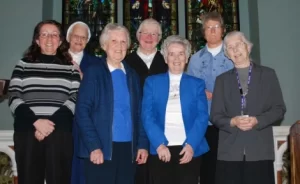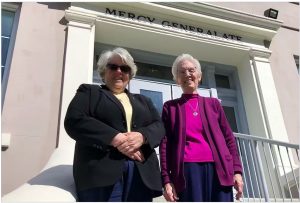In a very short time from now, Sister Elizabeth Davis, Sister of Mercy, will leave Newfoundland and Labrador to attend the Synod on Synodality in Rome. The call of the Synod is to: Communion, Participation and Mission.
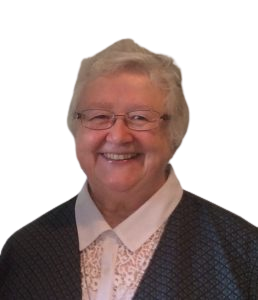 Elizabeth will be among 364 voting members in the 16th Ordinary General Assembly of the Synod and one of two Sisters of Mercy who will be voting members. The second Sister of Mercy is Sister Angela Perez from Guam, a member of the Institute of the Sisters of Mercy of the Americas.
Elizabeth will be among 364 voting members in the 16th Ordinary General Assembly of the Synod and one of two Sisters of Mercy who will be voting members. The second Sister of Mercy is Sister Angela Perez from Guam, a member of the Institute of the Sisters of Mercy of the Americas.
For the first time, laypeople will not only participate in the Synod of Bishops’ assembly but also will be full members, with the ability to vote on a final document at the end of the process in October 2024. More than 50 women will be voting members in the assembly scheduled for October 4–29, 2023, at the Vatican. Elizabeth is among five women religious chosen through the International Union of Superiors General (UISG) as voting members. Other women religious, including Sister Angela, have been named by the Conferences of Bishops.
During the nearly month-long Vatican assembly, the delegates will discuss questions posed in the recently released document Instrumentum Laboris, which covers such controversial topics as women deacons, priestly celibacy, and LGBTQ outreach and highlights a desire for new institutional bodies to allow for greater participation in decision-making by the “People of God.”
The 50-page document was written in April and May 2023 and approved by Pope Francis. The text itself stresses that it is “not a document of the Church’s Magisterium, nor is it the report of a sociological survey” but instead presents the “priorities that emerged from listening to the People of God” in the global Synod process thus far. The full text is available here.
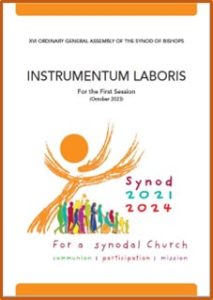 This document has two parts. Part One summarizes the insights gained from the listening sessions at the diocesan, national and continental levels, and outlines the vision of what a synodal church is and how it should proceed.
This document has two parts. Part One summarizes the insights gained from the listening sessions at the diocesan, national and continental levels, and outlines the vision of what a synodal church is and how it should proceed.
Part Two is comprised of a series of fifteen worksheets intended to guide the small group discussions at the assembly. The text outlines a “synodal method” of spirituality focused on listening to the Spirit and discerning the “signs of the times.”
In a change from recent Synods, Pope Francis has extended the timeframe of the Synod over three years (2021 to 2024) and has divided the general assembly into two sessions, one to be held in October 2023 and the second in October 2024. According to Cardinal Mario Grech, the head of the Vatican’s Synod office, conclusions will be reached only after the second and final session in 2024. At the end of the process in 2024, Synod assembly participants will vote on an advisory final document that will be presented to the pope, who can decide, if he wishes, to adopt the text as a papal document or to write his own at the conclusion of the Synod.
Canadian Bishops attending are Archbishop J. Michael Miller, C.S.B., Archdiocese of Vancouver; Bishop William T. McGrattan, Diocese of Calgary and Vice President of the Canadian Conference of Catholic Bishops; Bishop Marc Pelchat, Archdiocese of Quebec; Bishop Raymond Poisson, Bishop of Saint-Jérôme-Mont-Laurier and President of the Canadian Conference of Catholic Bishops; and Cardinal Gérald C. Lacroix, Archdiocese of Quebec.
In addition to the five Canadian Bishops, Canadian voting members representing the wider church are: Sami Aoun, Nominee of the Maronite, Melkite, and Syriac Catholic Churches in Canada; Catherine Clifford, Archdiocese of Gatineau, QC; Sr. Chantal Desmarais, scsm, Diocese of Joliette, QC; Linda Staudt, Diocese of London, ON; and Sister Elizabeth Davis rsm, Archdiocese of St. John’s, NL.
We congratulate Elizabeth for having responded so generously and courageously to this historic and very sacred invitation to participate in the Synod of the universal church and for being the voice of people in all their diversity and of all creation (which we know she will be!). We wish her well in the many demands of travel, “living out of a suitcase,” preparation, meetings, discussions, participation, and collaboration with representatives from around the world. We are proud and grateful that Elizabeth will participate in the Synod. We know that she will have great influence in her contribution to the Synod for the church and for the sake the world over the next year and beyond.
We offer this prayer for Elizabeth and for the Synod:
Holy and Triune God, we thank you for calling us to be Your Church,
and for showing her newer and more relevant ways of being
the Sign and Sacrament of God.
As the Synodal journey which began two years ago,
finds its culmination in the Synodal Event in October 2023,
we pray for a more intense experience of Your Spirit for all the faithful.
We thank you for blessing the Synodal preparatory work in communities,
institutions and by individuals.
May the significant event of the Synod open new doors for the Church
in her self-understanding and mission.
May the Synod remain open to grace, and approach all things
with humility and courage.
Dispose it to hear “what the Spirit is saying to the Church” (Rev 3:22)
and where the Spirit is blowing it to action. Amen.
-Sr. Mary John Kudiyiruppil, SSpS
Dentro de muy poco, la Hermana Elizabeth Davis, Hermana de la Misericordia, dejará Terranova y Labrador para asistir al Sínodo sobre la Sinodalidad en Roma. La llamada del Sínodo es: Comunión, Participación y Misión.
Elizabeth será uno de los 364 miembros con derecho a voto en la 16ª Asamblea General Ordinaria del Sínodo y una de las dos Hermanas de la Misericordia que serán miembros con derecho a voto. La segunda Hermana de la Misericordia es la Hermana Ángela Pérez, de Guam, miembro del Instituto de las Hermanas de la Misericordia de las Américas.
Por primera vez, los laicos no sólo participarán en la asamblea del Sínodo de los Obispos, sino que serán miembros de pleno derecho, con capacidad para votar un documento final al término del proceso en octubre de 2024. Más de 50 mujeres serán miembros con derecho a voto en la asamblea prevista del 4 al 29 de octubre de 2023 en el Vaticano. Elizabeth es una de las cinco religiosas elegidas a través de la Unión Internacional de Superioras Generales (UISG) como miembros con derecho a voto. Otras religiosas, entre ellas Sor Angela, han sido nombradas por las Conferencias Episcopales.
Durante la asamblea vaticana, de casi un mes de duración, los delegados debatirán las cuestiones planteadas en el documento Instrumentum Laboris, publicado recientemente, que abarca temas tan controvertidos como las mujeres diáconos, el celibato sacerdotal y el alcance LGBTQ, y destaca el deseo de que los nuevos órganos institucionales permitan una mayor participación en la toma de decisiones del “Pueblo de Dios.”
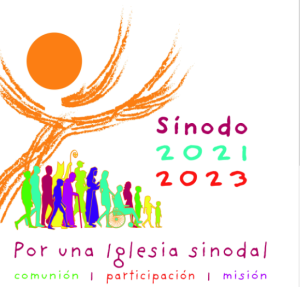 El documento, de 50 páginas, fue redactado en abril y mayo de 2023 y aprobado por el Papa Francisco. El propio texto subraya que “no es un documento del Magisterio de la Iglesia, ni el informe de una encuesta sociológica”, sino que presenta las “prioridades surgidas de la escucha del Pueblo de Dios” en el proceso global del Sínodo hasta ahora. El texto completo está disponible aquí.
El documento, de 50 páginas, fue redactado en abril y mayo de 2023 y aprobado por el Papa Francisco. El propio texto subraya que “no es un documento del Magisterio de la Iglesia, ni el informe de una encuesta sociológica”, sino que presenta las “prioridades surgidas de la escucha del Pueblo de Dios” en el proceso global del Sínodo hasta ahora. El texto completo está disponible aquí.
El documento consta de dos partes. En la primera parte se resumen las conclusiones extraídas de las sesiones de escucha a nivel diocesano, nacional y continental, y se esboza la visión de lo que es una Iglesia sinodal y cómo debería proceder.
La segunda parte se compone de una serie de quince fichas destinadas a orientar los debates en pequeños grupos durante la asamblea. El texto esboza un “método sinodal” de espiritualidad centrado en la escucha del Espíritu y el discernimiento de los “signos de los tiempos”.
En un cambio respecto a Sínodos recientes, el Papa Francisco ha ampliado el calendario del Sínodo a tres años (2021 a 2024) y ha dividido la asamblea general en dos sesiones, una que se celebrará en octubre de 2023 y la segunda en octubre de 2024. Según el cardenal Mario Grech, jefe de la oficina vaticana del Sínodo, las conclusiones no se alcanzarán hasta después de la segunda y última sesión, en 2024. Al final del proceso, en 2024, los participantes en la asamblea sinodal votarán un documento final consultivo que será presentado al Papa, quien podrá decidir, si lo desea, adoptar el texto como documento pontificio o redactar uno propio al concluir el Sínodo.
Los obispos canadienses asistentes son el arzobispo J. Michael Miller, C.S.B., archidiócesis de Vancouver; monseñor William T. McGrattan, diócesis de Calgary y vicepresidente de la Conferencia Episcopal Canadiense; monseñor Marc Pelchat, archidiócesis de Quebec; monseñor Raymond Poisson, obispo de Saint-Jérôme-Mont-Laurier y presidente de la Conferencia Episcopal Canadiense; y el cardenal Gérald C. Lacroix, archidiócesis de Quebec.
Además de los cinco obispos canadienses, los miembros canadienses con derecho a voto que representan a la Iglesia en general son: Sami Aoun, Nominado de las Iglesias católicas maronita, melquita y siríaca de Canadá; Catherine Clifford, Archidiócesis de Gatineau, QC; Sor Chantal Desmarais, scsm, Diócesis de Joliette, QC; Linda Staudt, Diócesis de London, ON; y Sor Elizabeth Davis rsm, Archidiócesis de St. John’s, NL.
Felicitamos a Elizabeth por haber respondido con tanta generosidad y valentía a esta invitación histórica y muy sagrada de participar en el Sínodo de la Iglesia universal y por ser la voz de las personas en toda su diversidad y de toda la creación (¡lo que sabemos que será!). Le deseamos lo mejor en las muchas exigencias del viaje, de “vivir con una maleta”, de la preparación, de las reuniones, de los debates, de la participación y de la colaboración con representantes de todo el mundo. Estamos orgullosos y agradecidos de que Elizabeth participe en el Sínodo. Sabemos que tendrá una gran influencia en su contribución al Sínodo para la Iglesia y para el bien del mundo durante el próximo año y más allá.
Ofrecemos esta oración por Isabel y por el Sínodo:
Dios Santo y Trino, te damos gracias por llamarnos a ser tu Iglesia,
y por mostrarle formas nuevas y más relevantes de ser
el Signo y Sacramento de Dios.
Mientras el camino sinodal que comenzó hace dos años
encuentra su culminación en el Evento Sinodal de octubre de 2023,
te pedimos una experiencia más intensa de tu Espíritu para todos los fieles.
Te damos gracias por bendecir el trabajo de preparación sinodal en las comunidades
instituciones e individuos.
Que el significativo acontecimiento del Sínodo abra nuevas puertas a la Iglesia
en su autocomprensión y misión.
Que el Sínodo permanezca abierto a la gracia y se acerque a todas las cosas
con humildad y valentía.
Que se disponga a escuchar “lo que el Espíritu dice a la Iglesia” (Ap 3,22)
y para que el Espíritu la impulse a la acción. Amén.
-Sr. Mary John Kudiyiruppil, SSpS
 The theme of this year’s Season of Creation is Let Justice and Peace Flow, based on Amos 5:24, where Amos uses the image of a mighty river to symbolize Justice. In his 2023 Creation Day message, Pope Francis asks that we “join the mighty river by transforming our hearts.” He goes on to say that this requires an ecological conversion and an integral approach to respect for the environment that involves relationship with God, with our sisters and brothers of today and into the future, with all of nature and with ourselves. He speaks of the synodal process in which our church is engaged as an invitation to all on this transformative journey to “coalesce in a majestic river of reflection and renewal” like the tributaries in nature which flow into and are absorbed into the mighty river.
The theme of this year’s Season of Creation is Let Justice and Peace Flow, based on Amos 5:24, where Amos uses the image of a mighty river to symbolize Justice. In his 2023 Creation Day message, Pope Francis asks that we “join the mighty river by transforming our hearts.” He goes on to say that this requires an ecological conversion and an integral approach to respect for the environment that involves relationship with God, with our sisters and brothers of today and into the future, with all of nature and with ourselves. He speaks of the synodal process in which our church is engaged as an invitation to all on this transformative journey to “coalesce in a majestic river of reflection and renewal” like the tributaries in nature which flow into and are absorbed into the mighty river.

 Elizabeth will be among 364 voting members in the 16th Ordinary General Assembly of the Synod and one of two Sisters of Mercy who will be voting members. The second Sister of Mercy is Sister Angela Perez from Guam, a member of the Institute of the Sisters of Mercy of the Americas.
Elizabeth will be among 364 voting members in the 16th Ordinary General Assembly of the Synod and one of two Sisters of Mercy who will be voting members. The second Sister of Mercy is Sister Angela Perez from Guam, a member of the Institute of the Sisters of Mercy of the Americas. This document has two parts. Part One summarizes the insights gained from the listening sessions at the diocesan, national and continental levels, and outlines the vision of what a synodal church is and how it should proceed.
This document has two parts. Part One summarizes the insights gained from the listening sessions at the diocesan, national and continental levels, and outlines the vision of what a synodal church is and how it should proceed. El documento, de 50 páginas, fue redactado en abril y mayo de 2023 y aprobado por el Papa Francisco. El propio texto subraya que “no es un documento del Magisterio de la Iglesia, ni el informe de una encuesta sociológica”, sino que presenta las “prioridades surgidas de la escucha del Pueblo de Dios” en el proceso global del Sínodo hasta ahora. El texto completo está disponible
El documento, de 50 páginas, fue redactado en abril y mayo de 2023 y aprobado por el Papa Francisco. El propio texto subraya que “no es un documento del Magisterio de la Iglesia, ni el informe de una encuesta sociológica”, sino que presenta las “prioridades surgidas de la escucha del Pueblo de Dios” en el proceso global del Sínodo hasta ahora. El texto completo está disponible  Irish-born Jane Fox arrived in St. John’s on October 21, 1881 to join the Sisters of Mercy, was received as Sister M. Joseph in March of 1882 and made profession of vows in April of 1884. She spent most of her religious life at Mercy Convent on Military Road, first teaching at Angels’ Guardian School and then at
Irish-born Jane Fox arrived in St. John’s on October 21, 1881 to join the Sisters of Mercy, was received as Sister M. Joseph in March of 1882 and made profession of vows in April of 1884. She spent most of her religious life at Mercy Convent on Military Road, first teaching at Angels’ Guardian School and then at 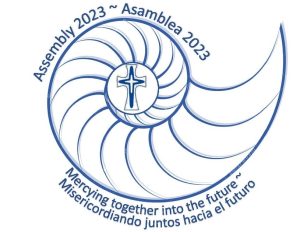 The Sisters of Mercy of Newfoundland have just completed an Assembly, August 21- 23. The theme of the Assembly was “Mercying Together into the Future.”
The Sisters of Mercy of Newfoundland have just completed an Assembly, August 21- 23. The theme of the Assembly was “Mercying Together into the Future.” 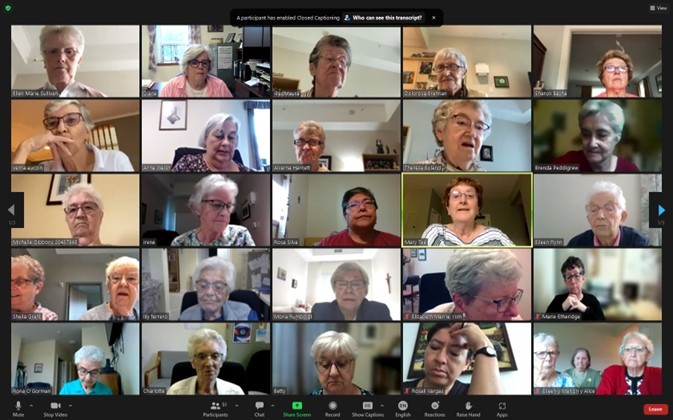
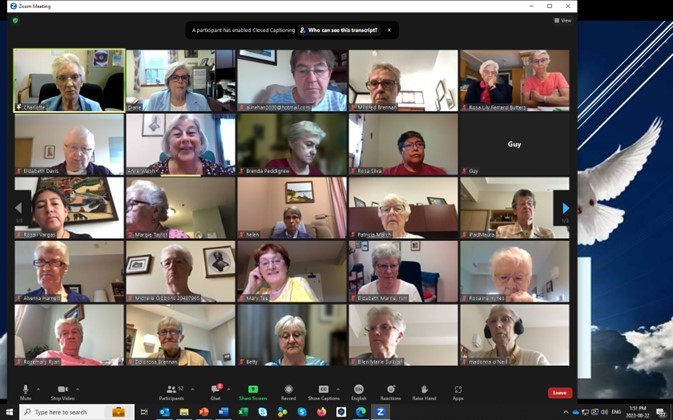
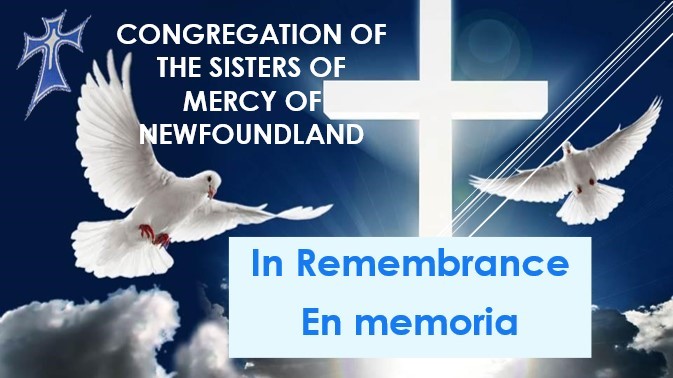











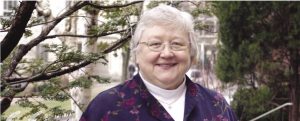 Although she denies it, Sister Elizabeth Davis, a member of the Congregation of the Sisters of Mercy of Newfoundland and Labrador, is becoming a Canadian icon: in education, in healthcare, in leadership development, in social policy and in religious studies, in Canada and abroad. With teaching appointments and participation on many boards and commissions, she leaves a trail of wisdom, quiet successes and vocal fans in her wake. In 2001, she won the Catholic Health Care Association of Canada’s Performance Citation Award and the Canadian Healthcare Association’s Award for Excellence in Distinguished Service. Those were followed by an Honorary Doctor of Laws from Memorial University of Newfoundland, induction into the Alpha Sigma Nu Honour Society of Jesuit Educational Institutions and an appointment as a Member of the Order of Canada in 2004. Recently, the University of Toronto’s Department of Health Policy, Management and Evaluation selected Sister Elizabeth as Leader of the Year for 2006. Ken Tremblay caught up with Sister Elizabeth at St. Augustine’s Seminary in Toronto, where she is currently teaching a course titled Introduction to the Old Testament.
Although she denies it, Sister Elizabeth Davis, a member of the Congregation of the Sisters of Mercy of Newfoundland and Labrador, is becoming a Canadian icon: in education, in healthcare, in leadership development, in social policy and in religious studies, in Canada and abroad. With teaching appointments and participation on many boards and commissions, she leaves a trail of wisdom, quiet successes and vocal fans in her wake. In 2001, she won the Catholic Health Care Association of Canada’s Performance Citation Award and the Canadian Healthcare Association’s Award for Excellence in Distinguished Service. Those were followed by an Honorary Doctor of Laws from Memorial University of Newfoundland, induction into the Alpha Sigma Nu Honour Society of Jesuit Educational Institutions and an appointment as a Member of the Order of Canada in 2004. Recently, the University of Toronto’s Department of Health Policy, Management and Evaluation selected Sister Elizabeth as Leader of the Year for 2006. Ken Tremblay caught up with Sister Elizabeth at St. Augustine’s Seminary in Toronto, where she is currently teaching a course titled Introduction to the Old Testament.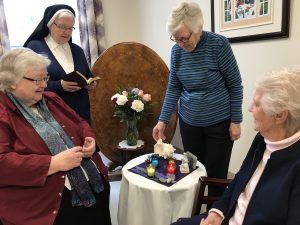 Each Sunday in Advent, Sr. Elizabeth Davis and her fellow Mercy sisters light a candle on their cosmic Advent wreath adorned with shells, pinecones, rocks and colorful ribbons.
Each Sunday in Advent, Sr. Elizabeth Davis and her fellow Mercy sisters light a candle on their cosmic Advent wreath adorned with shells, pinecones, rocks and colorful ribbons. 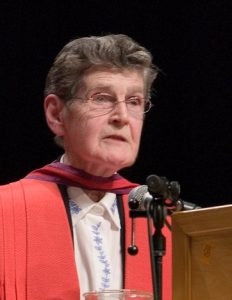 Her love for all humanity was not confined to her choral work. She has been a tireless advocate of the dignity of the homeless, the poor, and the physically and mentally frail. She initiated a multi-faith committee that crossed denominational boundaries to spearhead the distribution of food and clothes to the less fortunate in the City of St. John’s.
Her love for all humanity was not confined to her choral work. She has been a tireless advocate of the dignity of the homeless, the poor, and the physically and mentally frail. She initiated a multi-faith committee that crossed denominational boundaries to spearhead the distribution of food and clothes to the less fortunate in the City of St. John’s. The purpose of this study was to trace the work of the sisters of Mercy in Newfoundland in the field of business education. The Sisters began their work in the late 1800’s, when they first introduced business education courses into the curriculum of their convent schools. Their work continued until the mid-1900’s, when they began phasing out the formal business education programs which they had developed over the years in their schools. Their activities in this area constitute an important and lasting contribution to the field of business education. There has been no previous in-depth scholarly investigation into this aspect of the Sisters’ work. Therefore, a study of the Sisters’ contribution to this field is long overdue.
The purpose of this study was to trace the work of the sisters of Mercy in Newfoundland in the field of business education. The Sisters began their work in the late 1800’s, when they first introduced business education courses into the curriculum of their convent schools. Their work continued until the mid-1900’s, when they began phasing out the formal business education programs which they had developed over the years in their schools. Their activities in this area constitute an important and lasting contribution to the field of business education. There has been no previous in-depth scholarly investigation into this aspect of the Sisters’ work. Therefore, a study of the Sisters’ contribution to this field is long overdue.